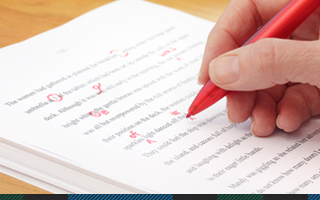
During the writing process, many writers tend to pre-edit their work while still crafting the story. An approach that is usually more effective is to schedule editing and writing as two separate parts of your routine. If you are a morning writer, wait at least until the evening before you edit anything. Depending on what works best for you, you can wait until the next day or you can even wait until you’ve completed a full draft of the book. The point is to allow your text a chance to fully develop.
There is no doubt that proper editing is a key factor in your book’s overall potential for success. Follow these basic editing tips for an in-production manuscript:
- Walk away before you edit. Give yourself some time to gain a fresh perspective, and return to your work with new eyes. Don’t try to edit or rework your story directly after a writing session. Everything looks different the next day.
- Don’t rely on your computer for editing. Your computer’s spelling and grammar check will only get you so far. Not only can it skip over misspellings and grammatical mistakes, but your computer does not recognize important subtleties in context or writing style.
- Let a professional read your manuscript. It’s okay to share your story with friends and family for their opinion of your book. However, you will need to rely on the critical eye of a professional for feedback that will help you improve your book’s content, grammar and structure.
Remember, the interior pages of your book are just as much a representation of your author brand as your investment in an eye-catching, customized exterior. The cover is meant to reach out to potential readers, alluring them to purchase the book. The written words, on the other hand, are what will keep the reader invested in your work and build loyalty.
Investing in editing services will assure that your book is within industry standards and is ready for your potential readers. If your work consistently presents a combination of clean content, a fluid storyline and your own unique writing style, readers will grow to have positive expectations for your work and for your author brand.
How do you balance writing and editing?

Thank you! It’s not as easy as it sounds! I was a medical transcriptionist for 30 years and edited reports thousands of times, but a book is different and very much more difficult! There is a program called grammerly that is very, very helpful. I learned a lot while editing. Another must-have book is The Christian Writer’s Manual of Style, which I bought in kindle format, and went through it with a fine-tooth comb. Very handy to have it right there on your computer where you can switch back and forth to your document and back to the manual. One of the most surprising things I learned was when to use the hyphen, dash, en-dash, and em-dash! Who knew there were such things! Happy writing!